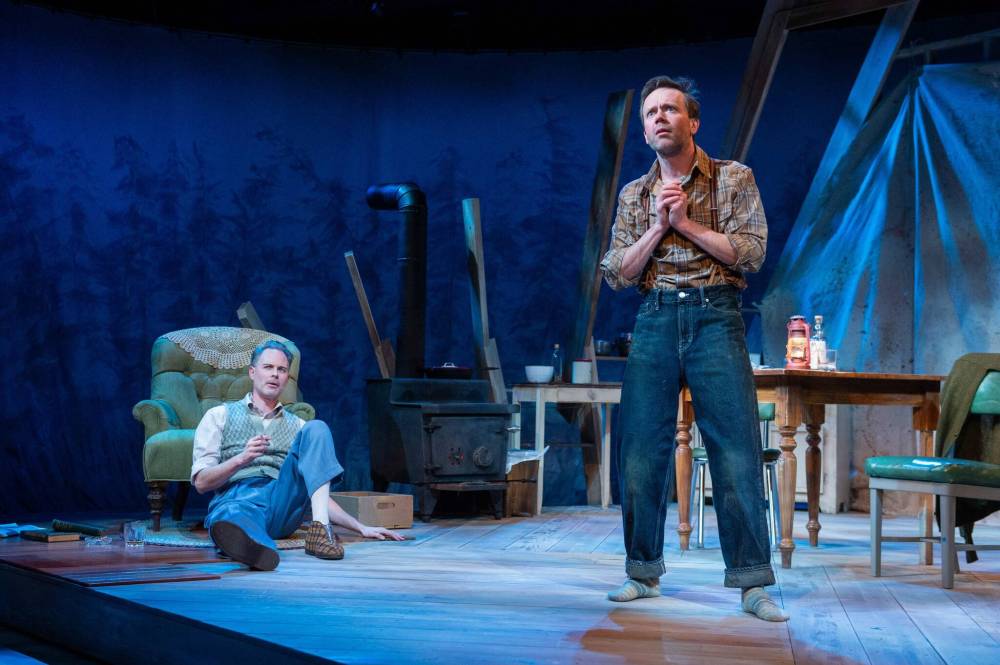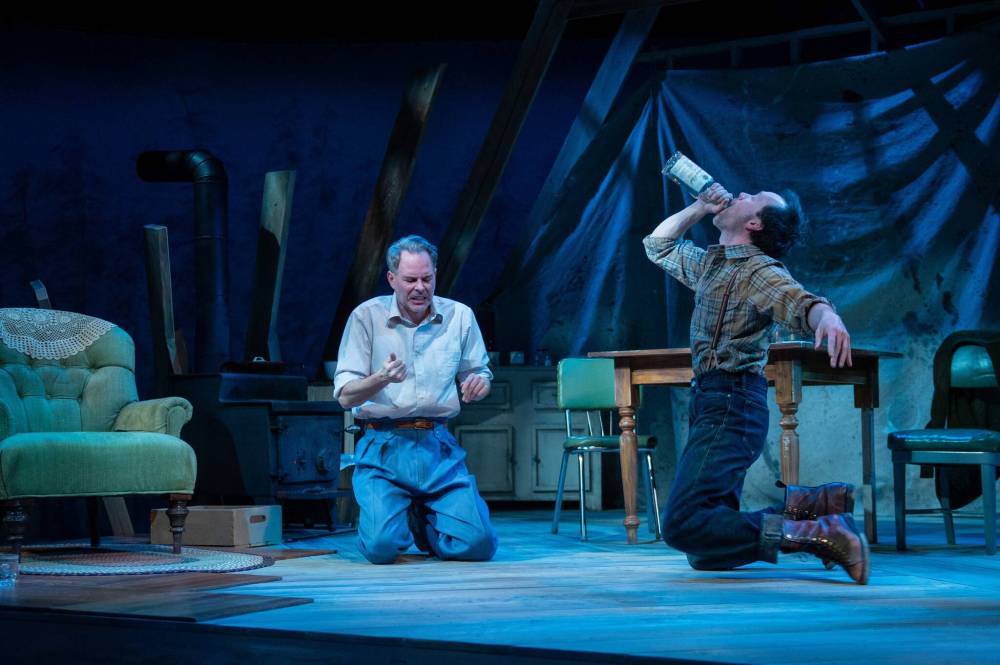Shouts of love across an A-frame
Poetry titans battle and bond in triumphant two-hander
Advertisement
Read this article for free:
or
Already have an account? Log in here »
To continue reading, please subscribe:
Monthly Digital Subscription
$0 for the first 4 weeks*
- Enjoy unlimited reading on winnipegfreepress.com
- Read the E-Edition, our digital replica newspaper
- Access News Break, our award-winning app
- Play interactive puzzles
*No charge for 4 weeks then price increases to the regular rate of $19.00 plus GST every four weeks. Offer available to new and qualified returning subscribers only. Cancel any time.
Monthly Digital Subscription
$4.75/week*
- Enjoy unlimited reading on winnipegfreepress.com
- Read the E-Edition, our digital replica newspaper
- Access News Break, our award-winning app
- Play interactive puzzles
*Billed as $19 plus GST every four weeks. Cancel any time.
To continue reading, please subscribe:
Add Free Press access to your Brandon Sun subscription for only an additional
$1 for the first 4 weeks*
*Your next subscription payment will increase by $1.00 and you will be charged $16.99 plus GST for four weeks. After four weeks, your payment will increase to $23.99 plus GST every four weeks.
Read unlimited articles for free today:
or
Already have an account? Log in here »
Hey there, time traveller!
This article was published 26/01/2024 (683 days ago), so information in it may no longer be current.
Whenever inspiration strikes Milton Acorn (Tom Keenan), the semi-tortured, Quasimodal poet assumes a more upright position. His wooden body loosens, words rush to his mouth, with Acorn unable to exert any control over his motormouth tongue.
Sometimes, in the opinion of his lyrical colleague Al Purdy (Eric Blais), Acorn’s work simply “doesn’t scan” as honest; it’s filled with too many flowers and not enough earth. But when Purdy — a cantankerous, vicious critic — recognizes a bit of genius, he always has the same response: “Write that down.”
Acorn usually resists putting pen to paper. “I’ll remember the good ones,” he says.

Dylan Hewlett photo
Eric Blais (left) and Tom Keenan portray Al Purdy and Milton Acorn in the comic exploration of two writers wrestling with solipsism, insecurity and each other.
If that’s the case, director Suzie Martin’s insightful treatment of David Yee’s sharp-toothed, beautifully structured among men deserves never to be forgotten.
An impassioned ode to language, among men — a co-production of Theatre Projects Manitoba and Royal Manitoba Theatre Centre that opened at the Warehouse on Thursday — is a talkative, bawdy and comic exploration of two writers wrestling with solipsism, insecurity and each other in an A-frame cabin in Ontario’s Prince Edward County.
Yee’s script is a vehicle for a tightly wound critique of criticism itself, a blisteringly funny exposition of the inane ways society decides what art is of value and what is destined for the dumpster.
“If you’re gonna appraise something, you need to know the guts of it,” Purdy says after asking Acorn to explain the biographical origins of one poetic explosion.
“What did you think?” Acorn asks after obliging the request. Purdy’s reply: “Oh, what do I know?”
This production has guts to spill, too, though Yee’s play takes place around 1959 before either of these poets — among the most influential in Canadian history — achieved national renown with each writer going on to win Governor General’s awards and produce dozens of prized collections.
Yee’s story finds Purdy ready to toss his latest into the fireplace, with a penniless Acorn just as forlorn about his own literary prospects. With his icy marriage thawing, Purdy decamps to isolated terrain, inviting Acorn, a former carpenter, to trade old saws and sharp barbs.
It’s as reliable a conceit as any in entertainment: put two highly intelligent, overtly sensitive characters in an enclosed place and wait patiently for the stick of dynamite to go boom.
Quoting T.S. Eliot, W.B. Yeats, Dante and Acorn and Purdy themselves, among men is peppered with performances of poetry, allowing the production to flow like a chap-book musical; in many languages, the words for poem and song are one and the same.
These roles are played brilliantly by Keenan and Blais, with both Winnipeg actors at the top of their game, delighting in enlivening Yee’s stout writing with charm and physicality.
Keenan is blessed with a face he can crumple like newspaper and smooth out like silk. He makes the audience not just worry for Acorn’s well-being, but hope desperately for his self-actualization — a testament to Keenan’s eminent likability as an actor. Acorn puts himself down constantly, calling himself a “mule amongst thoroughbreds” and a “nuisance on the lawn.”
The only one who can keep pace with the insults is Purdy, calling Acorn a marionette, a street urchin, and “a guy who looks like a wax figure of himself.” Keenan, in a creaky Charlottetown brogue, merely calls his host an arsehole, relishing the arse.
Blais is just as skilled, establishing Purdy as a man just as weathered as he is vain. Less tempestuous than Acorn and twice as pompous, his Purdy is a towering presence.
The men are dressed head to toe in era-appropriate garb, right down to the point of the collar, by Daina Leitold, who empowers each character with her costume design.

Dylan Hewlett
Eric Blais & Tom Keenan play Al Purdy and Milton Acorn in among men, a talkative, bawdy and comic exploration of two writers.
Adam Parboosingh’s set — open-ended, cosy and pastoral — is filled with furniture that looks as if it all came from elsewhere, various totems from Purdy’s less permanent homesteads. One standout detail is the dining room table with three spindled legs and one replacement. Who’s to say why, but it makes the room much more interesting, inviting speculation.
There is an Odd Couple element at play, but among men is in no way an homage. If anything, there’s a Costanza-Seinfeld dynamic, especially during a heated debate over the class politics of breakfast.
Purdy’s poached eggs are too bourgeois, according to Acorn, who prefers a “working man’s egg,” one more aligned with the yolk of the proletariat.
Yee’s script is based on Acorn and Purdy’s written correspondence, along with Purdy’s poem House Guest. The conversations in the production are mostly imagined, but feel fully realized.
Among men is rich and fierce without prior exposure to Purdy and Acorn’s writing — sure to be inspired after viewing — but some familiarity enhances the experience. Yee sprinkles references to the poets’ best-known works throughout their conversations, notably a double-mention of Acorn’s I’ve Tasted My Blood, a poem of resigned suffering and the roughness of memory.
For these men, poetry is a release valve and a bandage used to stanch the pain behind the veil of their own fictions. It’s as functional as it is medicinal. During one character’s panic attack, the other cradles him in his arms and recites a poem of his own to squelch the demons.
“Clouds must be clouds always, even if they’ve not decided what to be at all,” he says.
It’s a gorgeous display, so much more effective than a demand to “calm down.” It’s also a model for the kind of therapeutic communication only made possible by complete trust and shared vulnerability, a rarity in male friendship but a prerequisite in the kind of work Yee has produced, which ends with a shout of love.
Among men is part biography, part bibliography and part ethnography.
It’s also a complete triumph, which, with any justice, will endure as a Canadian classic — one worth remembering.
ben.waldman@winnipegfreepress.com

Ben Waldman is a National Newspaper Award-nominated reporter on the Arts & Life desk at the Free Press. Born and raised in Winnipeg, Ben completed three internships with the Free Press while earning his degree at Ryerson University’s (now Toronto Metropolitan University’s) School of Journalism before joining the newsroom full-time in 2019. Read more about Ben.
Every piece of reporting Ben produces is reviewed by an editing team before it is posted online or published in print — part of the Free Press‘s tradition, since 1872, of producing reliable independent journalism. Read more about Free Press’s history and mandate, and learn how our newsroom operates.
Our newsroom depends on a growing audience of readers to power our journalism. If you are not a paid reader, please consider becoming a subscriber.
Our newsroom depends on its audience of readers to power our journalism. Thank you for your support.



